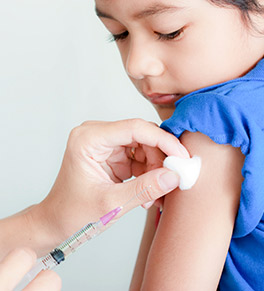Is COVID-19 altering childhood diseases?

After two years of living with COVID-19, parents and pediatricians alike are noticing that childhood viruses virtually unseen during the pandemic are back — including flu, rhinoviruses and respiratory syncytial virus (RSV) — and they’re showing up out of season.
“Years of masking, handwashing and social distancing made most of these viruses disappear,” says Dr. Coleen K. Cunningham, a UCI Health pediatrician who specializes in childhood infectious diseases. “Now that we are all out and about and resuming our normal lives, it’s natural that they are resurfacing.”
There is no need to be unduly alarmed or to cocoon your kids, though, adds the professor and chair of the UCI School of Medicine’s Department of Pediatrics and senior vice president and pediatrician-in-chief for CHOC Children's Health of Orange County.
“It’s a normal part of childhood to get viral infections. Although we’re seeing these viruses return out of season, kids are not at any higher risk catching them this summer versus the normal fall and winter season. They are not any more dangerous than they were before COVID-19.”
Which illnesses should parents be most concerned about?
Historically, viruses go through mutations, changing a little bit every year.
“I would say respiratory syncytial virus — a common respiratory virus that causes mild, cold-like symptoms — is of most concern right now,” says Cunningham. “RSV can require hospitalization in children under 12 months of age, especially pre-term babies, and those whose immune systems are compromised. It also can be serious in older adults.”
But COVID-19 and influenza viruses remain a serious risk for kids, she adds, and parents should make sure to vaccinate their children for both.
What are the best ways to keep kids healthy?
The tried-and-true methods for preventing childhood infections are still paramount, Cunningham says. They include:
- Washing your hands and those of your little ones frequently. “Teach your kids this important habit to eliminate germs and stay healthy,” she advises.
- Getting regular checkups and staying up-to-date with all childhood vaccinations, especially for COVID-19 and influenza. “The next flu vaccination won’t be available until the fall but don’t delay getting the COVID-19 vaccine.”
- Keeping kids home when they are sick. “People didn't often take that very seriously prior to the pandemic but it’s extremely important now because COVID-19 may have only mild symptoms.”
But don’t restrict activities out of fear of infection, she says. “Children really do need to be active and to socialize. Outdoor activities have the lowest risk and if you’re worried about indoor activities, you can certainly have them mask.”
COVID-19 vaccines for children under 5
Now that COVID-19 vaccines have been approved for children under age 5, this group of little ones can finally be protected against severe illness from the virus.
The U.S. Food and Drug Administration (FDA) and the Centers for Disease Control and Prevention (CDC) last week authorized Pfizer’s three-dose vaccine for children ages six months to 4 years and Moderna’s two-dose vaccine for children ages six months to 5 years.
“These low-dose vaccines are not only safe but necessary," says Cunningham.
In both the Pfizer and Moderna clinical trials, the most common side effects were pain at the injection site, irritability and crying, loss of appetite and sleepiness, the FDA reported. Very few children developed a fever higher than 102 degrees Fahrenheit and there were no cases of myocarditis, a type of heart inflammation.
Understandably, parents want to make the best choices, Cunningham says. But it’s important to get accurate information when making decisions, rather than rely social media or anecdotal reports. That’s why she recommends consulting with your child’s doctor.
“Our role as pediatricians is to provide the most up-to-date information and guide parents toward the most beneficial health outcomes for their children.”
Cunningham has no qualms about recommending the newly approved COVID-19 vaccines to prevent severe illness among the youngest children.
“Besides being a pediatrician, I’m a mother to five grown children and now a grandmother to four,” she says. “I can pretty much guarantee that my kids will vaccinate all my grandbabies with the COVID-19 vaccine as soon as they turn six months old.”




